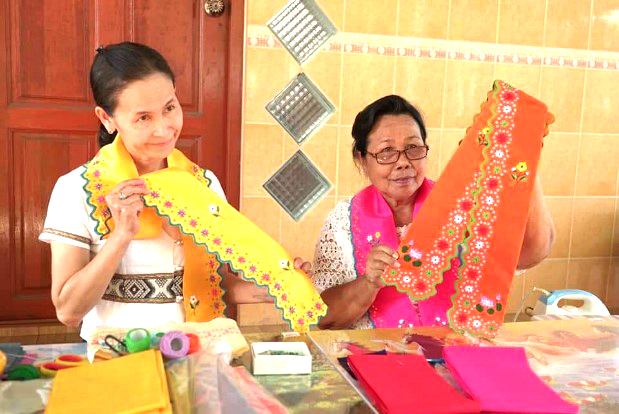Potential Development of Community Based on Thai-Mon Cultural Resources, Ban Ngio Community, Pathum Thani Province
Main Article Content
Abstract
Ban Ngio community, Sam Khok district, Pathum Thani province is a community consisting of Buddhist Thais and Thai-Mon descendants who have co-existed for ages under their traditions and beliefs based on Thai-Mon culture. This research aims to develop the community potential based on the local resources. It employs a participatory action research process targeting public recognition of the community and a channel for support from government agencies. A community enterprise, the Local Tourism Community of Ban Ngio, was established to serve the following purposes: 1) to promote community clusters for career development and internal support, 2) to develop knowledge and skills for people in the community, and 3) to promote community-based tourism. The research steps comprised: 1) training local interpreters, 2) establishing a learning station of traditional Mon breast cloth weaving within the community, 3) developing local products to meet the product standard, and 4) marketing the products both inside and outside the community. As a research result, the community clusters mean supplementary careers of selling local products which have increased the incomes. Additionally, the collaboration of people in the community contributes to unity and sustainable community development. In conclusion, the opening of Thai-Mon cultural tourism has generated income as well as promoted preservation of the local culture and traditions.
Article Details

This work is licensed under a Creative Commons Attribution-NonCommercial-NoDerivatives 4.0 International License.
Area Based Development Research Journal values copyright protection and licensing to safeguard author rights and facilitate the appropriate dissemination of research. Our policies ensure openness, accessibility, and attribution. Authors retain copyright ownership, and articles are published under a Creative Commons Attribution License (CC BY), allowing sharing, adaptation, and proper attribution. Authors have the freedom to publish under the CC BY license, granting broad reuse and distribution permissions. The journal supports posting articles on third-party repositories, adhering to institutional and funding restrictions. Author guidelines detail copyright and licensing requirements, empowering authors with knowledge about their rights and responsibilities. These policies cultivate an environment of collaboration, openness, and responsible sharing, benefiting authors and the research community while honoring intellectual property rights.
References
Ampansirirat, A., & Wongchaiya, P. (2017). The participatory action research: key features and application in community. Journal of Humanities and Social Sciences, Mahasarakham University, 36(6), 192-202. (in Thai).
Apibunyopas, J., & Lakkanawanit, P. (2020). Business potential development of trading village for Khaw Khunkha Chawna Khunatham community enterprise, Yasothon province. Area Based Development Research Journal, 12(2), 110–118. (in Thai).
Ban Ngio Subdistrict Administrative Organization. (2020). Community information report. Retrieved December 5, 2020, from: http://www.banngew.go.th. (in Thai).
Ganjanapan, A. (2008). Multiculturalism in the context of social and cultural change. Chiang Mai: Chiang Mai University. (in Thai).
Kemmis, S., & McTaggart, R. (1988). The action research planner. (3rd ed.). Victoria: Deakin University.
Naiyapatana, O. (2005). Quantitative and qualitative research methodologies. Bangkok: Samlada. (in Thai).
Organizations – Open Government Data of Thailand. (2018). Interpreter development guide. Retrieved December 5, 2020, from:http://www.data.go.th. (in Thai).
Pangsoi, K. (2018). Community leaders’ cultural management in activity enhancement for social security and sustainability. Journal of MCU Social Science Review, 7(1), 32-42. (in Thai).
Phanmool, J., & Phopunprom, P. (2020). Multicultural activities to promote culture tourism in Ko Kret, Nonthaburi province. Area Based Development Research Journal, 12(4), 307–318. (in Thai).
Wanlan, D. (2009). The development of the concept of reconciliation culture of a multicultural society as per the views of border patrol police with experience in working in the three southern border provinces (Research report). Songkhla: Thaksin University. (in Thai).


